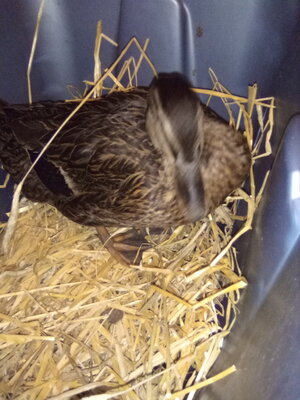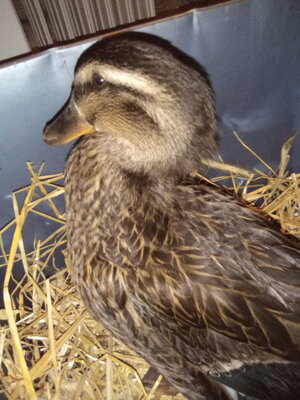My papals dog recently grabbed my female duck up by her neck. She's a small mallard duck. Since then she's been keeping her head down to her chest and won't quack at all. Usually when I quack for them they come running and she will start quaking very loudly but she won't. She's barely eating or drinking and I'm really starting to worry. Please help
Navigation
Install the app
How to install the app on iOS
Follow along with the video below to see how to install our site as a web app on your home screen.
Note: This feature may not be available in some browsers.
More options
You are using an out of date browser. It may not display this or other websites correctly.
You should upgrade or use an alternative browser.
You should upgrade or use an alternative browser.
Ducks keeping her head down to her chest
- Thread starter Lil_ducky
- Start date
- Thread starter
- #3
I can't see any injuries but I'll post pics of her when I get home. And it's been about 2 days. She's been pooping.Are you able to see any injuries on her neck?
Could you post a few pictures of the duck?
How long has she not been eating, or drinking? Is she producing poops?
I can't see any injuries but I'll post pics of her when I get home. And it's been about 2 days. She's been pooping.
If you gently, try to pry her neck up, is she able to show any muscle movement in it, or does it just droop back down?
Can you readily get supplies from a feed store, and/ or pharmacy in your area?
- Thread starter
- #5
I haven't tried to touch her neck cause I've been scared I'd hurt her and idk. Theres a feeders supplies a bit away from my homeIf you gently, try to pry her neck up, is she able to show any muscle movement in it, or does it just droop back down?
Can you readily get supplies from a feed store, and/ or pharmacy in your area?
I haven't tried to touch her neck cause I've been scared I'd hurt her and idk. Theres a feeders supplies a bit away from my home
Dogs have very powerful bites, so the idea that there is muscle damage in the neck, directly due to the dog, sounds most probable. Generally speaking, with birds the first goal is addressing hydration and nutritional needs and correcting any concerns with their body temperature.
If you have noted your bird is not eating much, it's likely she has a lowered body temperature and is having a hard time maintaining warmth. Externally, that can be seen by her having a hunched over-look. Since sick birds tend to suffer from hypothermia easily, it would be a good idea to bring her inside, and set her in a warm, dimly area, with feed and water provided. If she is having a hard time keeping her neck up, it would be best if you add marbles, or rocks into the waterer to prevent any chance of aspiration, or drowning.
To help prevent further dehydration, you can try dripping sugar water along her bill (keeping her neck upright), but it's unlikely you will be able to get the number of fluids she needs just by simply dripping it against her bill.
Preferably with severely dehydrated birds, you give them fluids IV, SQ, or IO, but administering birds at home in such a route is impractical for most new/inexperienced owners. A simpler, fairly effective way to give fluids is by crop feeding, where you pass a tube through the birds esophagus into their crop. Information on tube feeding can be found on the links below, and only requires a few supplies, including parrot baby feeding formula, 60ml syringe, gram scale, and a red rubber catheter to administer with. It is sad, but often true that most of these sick/injured birds die because of dehydration, before anything else.
https://www.backyardchickens.com/threads/tube-feeding-ducks-updated-5-7-2020.1211994/
https://www.backyardchickens.com/th...ng-guide-pictures-under-construction.1064392/
Take a look at the links above, and try to work on getting some of those supplies as soon as you can. If you see any puncture wounds on the neck area, antibiotics may be a good idea. Enrofloxacin, Cephalexin, and Clindamycin are some antibiotics that can be obtained online without an RX, and have good coverage.
https://allbirdproducts.com/products/baytril-10
Of course, a vet tends to be the best route to take, so if you live near one, that would be best.
- Thread starter
- #7
Thank you so much I really appreciate your help. Thank youDogs have very powerful bites, so the idea that there is muscle damage in the neck, directly due to the dog, sounds most probable. Generally speaking, with birds the first goal is addressing hydration and nutritional needs and correcting any concerns with their body temperature.
If you have noted your bird is not eating much, it's likely she has a lowered body temperature and is having a hard time maintaining warmth. Externally, that can be seen by her having a hunched over-look. Since sick birds tend to suffer from hypothermia easily, it would be a good idea to bring her inside, and set her in a warm, dimly area, with feed and water provided. If she is having a hard time keeping her neck up, it would be best if you add marbles, or rocks into the waterer to prevent any chance of aspiration, or drowning.
To help prevent further dehydration, you can try dripping sugar water along her bill (keeping her neck upright), but it's unlikely you will be able to get the number of fluids she needs just by simply dripping it against her bill.
Preferably with severely dehydrated birds, you give them fluids IV, SQ, or IO, but administering birds at home in such a route is impractical for most new/inexperienced owners. A simpler, fairly effective way to give fluids is by crop feeding, where you pass a tube through the birds esophagus into their crop. Information on tube feeding can be found on the links below, and only requires a few supplies, including parrot baby feeding formula, 60ml syringe, gram scale, and a red rubber catheter to administer with. It is sad, but often true that most of these sick/injured birds die because of dehydration, before anything else.
https://www.backyardchickens.com/threads/tube-feeding-ducks-updated-5-7-2020.1211994/
https://www.backyardchickens.com/th...ng-guide-pictures-under-construction.1064392/
Take a look at the links above, and try to work on getting some of those supplies as soon as you can. If you see any puncture wounds on the neck area, antibiotics may be a good idea. Enrofloxacin, Cephalexin, and Clindamycin are some antibiotics that can be obtained online without an RX, and have good coverage.
https://allbirdproducts.com/products/baytril-10
Of course, a vet tends to be the best route to take, so if you live near one, that would be best.
Thank you so much I really appreciate your help. Thank you
You're most certainly welcome. Keep us posted on how she does, and I'm still interested in the pictures when you're able to get some.
- Thread starter
- #9
I will. And I'll get the pictures of her as soon as I get homeYou're most certainly welcome. Keep us posted on how she does, and I'm still interested in the pictures when you're able to get some.

- Thread starter
- #10
I will. And I'll get the pictures of her as soon as I get home

Attachments
New posts New threads Active threads
-
Latest threads
-
Is it safe to leave 3 week old goslings with 4 month old geese?
- Started by starrymutt
- Replies: 0
-
-
-
Is it possible to use turkeys to naturally hatch large batches of chicks?
- Started by Gigachad poultry
- Replies: 3
-
-
-
Threads with more replies in the last 15 days
-
-
-
Name that chicken contest month by month 2024 july
- Started by Golden Comet Mama
- Replies: 82
-
Equate miconazole monostat for doughy sour crop now lethargic HELP
- Started by Yellow321
- Replies: 74
-
I need art practice(I will *Try* to draw your poultry)
- Started by my spoiled chickens
- Replies: 74
-






